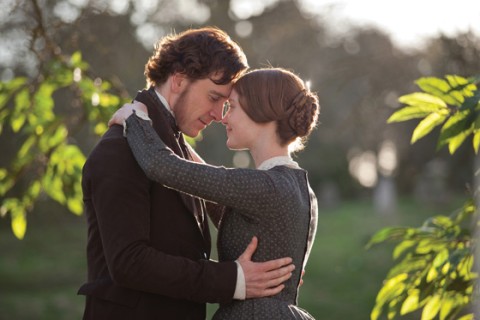Jane Eyre

Dramatic adaptations of Charlotte Brontë's Jane Eyre tend to go for romantic embroidery and Gothic grandiloquence. But the new movie version, directed by Cary Fukunaga, feels pared down in all respects except the emotional. It has a piercing ferocity.
Moira Buffini's expertly redacted screenplay gets to the heart of the novel, the passionate love affair of two intellectual equals who are also cursed souls: an unwanted 19-year-old orphan (Mia Wasikowska) hired on as a governess at a country estate called Thornfield, and her rich employer, Edward Rochester (Michael Fassbender), whose clandestine past follows him like a ghost. Buffini begins with Jane's desperate escape from Thornfield after her engagement to Rochester blows up in her face. Jane's attempt to reinvent herself is the frame for a series of flashbacks to her miserable childhood—first with the aunt who raises her without affection and then at Lowood School, a charitable institution run by a pitiless tyrant—and to her tenure at Thornfield, where she experiences freedom and love for the first time.
Reconfiguring the narrative is a gamble that pays off brilliantly. St. John Rivers (Jamie Bell), the devout missionary who rescues Jane from starvation after she runs away from Thornfield, comes across as a humane but equally unyielding echo of Mr. Brocklehurst (Simon McBurney), the zealot in charge of Lowood. (Jane's childhood companion, the doomed Helen Burns, is a warmer, open-hearted Christian soul countering both these chilly men.) And St. John—who offers Jane marriage without love, both of them sacrificing their desires to toil for God—is a dim alternative to Rochester's heart-whole lover, willing to challenge social convention to win the woman he adores.





